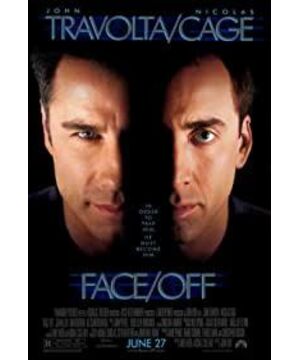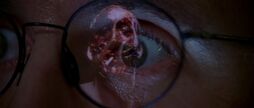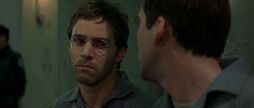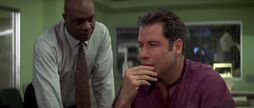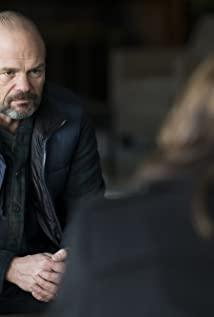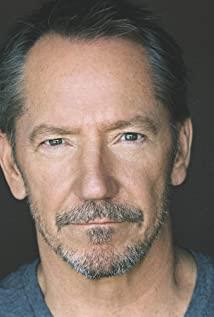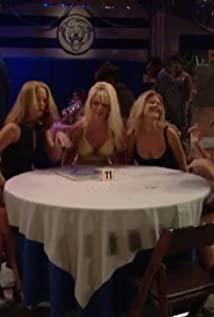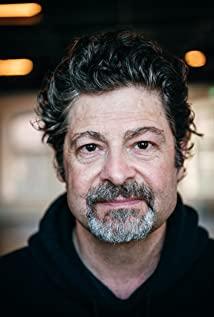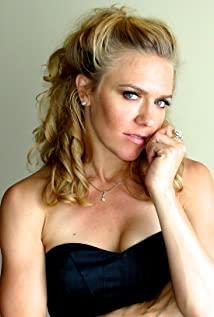Maybe it's personal preference, I feel that this movie is the peak of John Woo, Cage, and John Travolta.
Wu Yusen has been in Hollywood for many years, and has achieved personal glory with this film. After that, there are almost no good works.
Cage has successfully become the new favorite of action films with "Stone Shattering" and "Changing Faces", but I personally feel that this film is Cage showing his greatest talent.
John Travolta, except John Woo who can make him so handsome, who can make his "ridiculous" chin so cute.
In addition to the perfect combination of action scenes and John Woo's violent aesthetics, "Face Change" contains more of Woo's mix of Eastern and Western cultures.
This seems to be a reference to the story of the "human skin mask" in martial arts novels. After Wu Yusen's tempering, it is mixed with more thoughts on human nature and destiny.
Thinking about good and evil finally rises to self-reflection. As early as "Across the Four Seas", John Woo liked to occasionally reveal the perspective of "God", and this time it was a complete nirvana.
Let's talk about "Black Cage" first, this is an out-and-out villain. In his world, doing bad things seems to be his only purpose, but in his heart, at least he still has a bottom line, that is Do not harm children.
But this, is broken at the beginning of the story, which also leads to a formal break between black and white.
During the time when Cage was "black", it also contributed considerable evil.
The first one was probably when Black Cage shouted "Hallelujah" and touched the butt of the beautiful woman. At that moment, Cage, the contrast between evil and hymn was extreme.
Second, I have to say that the scene of Hei Cage getting off at the airport, wearing a black trench coat, is simply handsome.
The third one is about "peach".
But soon, Black Cage turned into White Cage.
Starting from the change of identity, the acting skills of the two actors are basically in their eyes, and they are absolutely enjoyable.
When good is driven to a dead end by evil, what should we do?
This proposition may be full of pessimistic despair.
Woo Yusen used an almost absurd approach to show the hopelessness of a confrontation between good and evil.
Bai Kaiqi can only use the "black" methods of the past to carry out a just counterattack, which is full of irony in itself.
The questions raised by John Woo with the help of the movie need philosophers to consider how to solve them. Let’s watch it live.
The white John in the story is the embodiment of justice.
However, this incarnation of justice was blinded by hatred, and the relationship between family members and colleagues was in a mess.
Too much focus on "goodness" sometimes fails to achieve good results. This is even more ironic.
And after transforming into Black John, Black John is literally full of drama.
A bad guy, unexpectedly won the admiration of his colleagues from the heart, and incidentally solved the family problem of "severing and unreasonable".
This paradox, how can people be good...
In terms of family issues, Black John has also experienced an unusual baptism. He finally had the opportunity to stand in front of the tomb of the child he killed by mistake. This child is his "nominal" child. At that moment, Black John's eyes were full of drama, which was regarded as one of the few "good" expressions of Black John. Bar.
On the issue of his daughter, John Black expounded the reason for his daughter's rebelliousness. This problem has been entangled in the family for a long time, and it is a great irony that a "bad guy" has seen everything. And in order to "protect" his daughter, Black John actually planted a "bane" for himself, which is another fateful arrangement.
The question of fate is more reflected in the fact that Black John dismantled the bomb himself.
If according to the initial arrangement, even if John Bai knew where the bomb was, he probably wouldn't be able to disarm the bomb easily, and damage would be inevitable. The magical fate made the most appropriate arrangement, but it was also the most bizarre arrangement.
The lines of the story are also carefully polished.
Often the unintentional words have long ago revealed the secret, but the people in the story have passed it over like "Tai Chi gossip", which is quite a bit of "playing the machine".
The charm of Eastern and Western languages is reflected in the story.
The most impressive sentence was contributed by Black John - I don't want you to go, but I want to watch you go.
The arrangement of props in the story is also unique.
The most prominent is probably the design of the mirror.
This is a duel between good and evil, but it is also a duel facing one's own heart.
Maybe, everyone has a time when they need to face themselves. One day, you no longer need that scar to remind yourself of your past pain, and you will learn to say goodbye to the past.
In the story, of course, John Woo is good at churches, white pigeons and slow motion.
In a sacred place, entangled in an unbreakable grievance, John Woo likes to highlight the contradiction through such a strong contrast.
John Travolta wanted John Woo to make him as handsome as Fa Ge, and John Woo did it.
This scene in the church has a bit of the meaning of "Blood Two Heroes" back then.
The movie is worthy of N brushing, if it is purely regarded as an action movie, it is a little underestimated.
View more about Face/Off reviews


